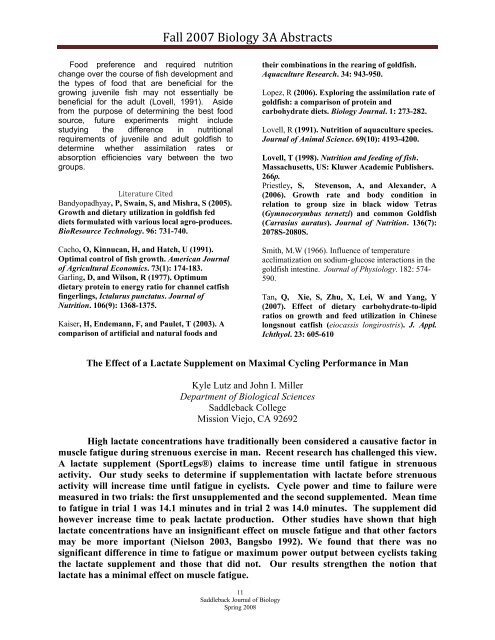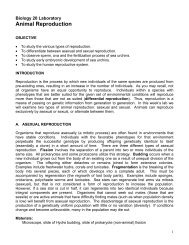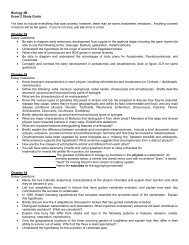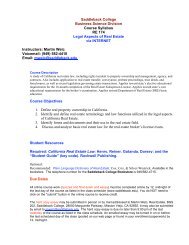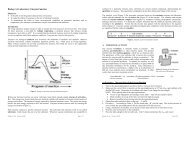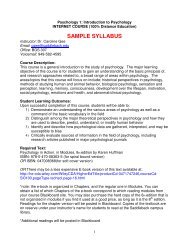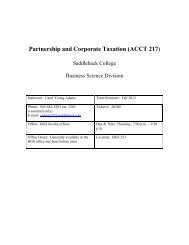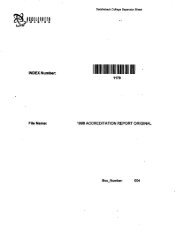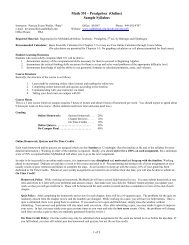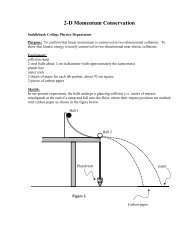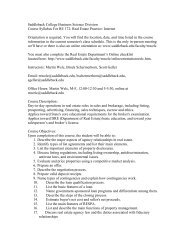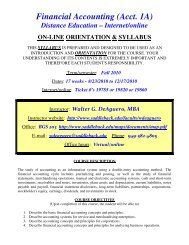Volume 6, Spring 2008 - Saddleback College
Volume 6, Spring 2008 - Saddleback College
Volume 6, Spring 2008 - Saddleback College
Create successful ePaper yourself
Turn your PDF publications into a flip-book with our unique Google optimized e-Paper software.
Fall 2007 Biology 3A Abstracts<br />
Food preference and required nutrition<br />
change over the course of fish development and<br />
the types of food that are beneficial for the<br />
growing juvenile fish may not essentially be<br />
beneficial for the adult (Lovell, 1991). Aside<br />
from the purpose of determining the best food<br />
source, future experiments might include<br />
studying the difference in nutritional<br />
requirements of juvenile and adult goldfish to<br />
determine whether assimilation rates or<br />
absorption efficiencies vary between the two<br />
groups.<br />
Literature Cited<br />
Bandyopadhyay, P, Swain, S, and Mishra, S (2005).<br />
Growth and dietary utilization in goldfish fed<br />
diets formulated with various local agro-produces.<br />
BioResource Technology. 96: 731-740.<br />
Cacho, O, Kinnucan, H, and Hatch, U (1991).<br />
Optimal control of fish growth. American Journal<br />
of Agricultural Economics. 73(1): 174-183.<br />
Garling, D, and Wilson, R (1977). Optimum<br />
dietary protein to energy ratio for channel catfish<br />
fingerlings, Ictalurus punctatus. Journal of<br />
Nutrition. 106(9): 1368-1375.<br />
Kaiser, H, Endemann, F, and Paulet, T (2003). A<br />
comparison of artificial and natural foods and<br />
their combinations in the rearing of goldfish.<br />
Aquaculture Research. 34: 943-950.<br />
Lopez, R (2006). Exploring the assimilation rate of<br />
goldfish: a comparison of protein and<br />
carbohydrate diets. Biology Journal. 1: 273-282.<br />
Lovell, R (1991). Nutrition of aquaculture species.<br />
Journal of Animal Science. 69(10): 4193-4200.<br />
Lovell, T (1998). Nutrition and feeding of fish.<br />
Massachusetts, US: Kluwer Academic Publishers.<br />
266p.<br />
Priestley, S, Stevenson, A, and Alexander, A<br />
(2006). Growth rate and body condition in<br />
relation to group size in black widow Tetras<br />
(Gymnocorymbus ternetzi) and common Goldfish<br />
(Carrasius auratus). Journal of Nutrition. 136(7):<br />
2078S-2080S.<br />
Smith, M.W (1966). Influence of temperature<br />
acclimatization on sodium-glucose interactions in the<br />
goldfish intestine. Journal of Physiology. 182: 574-<br />
590.<br />
Tan, Q, Xie, S, Zhu, X, Lei, W and Yang, Y<br />
(2007). Effect of dietary carbohydrate-to-lipid<br />
ratios on growth and feed utilization in Chinese<br />
longsnout catfish (eiocassis longirostris). J. Appl.<br />
Ichthyol. 23: 605-610<br />
The Effect of a Lactate Supplement on Maximal Cycling Performance in Man<br />
Kyle Lutz and John I. Miller<br />
Department of Biological Sciences<br />
<strong>Saddleback</strong> <strong>College</strong><br />
Mission Viejo, CA 92692<br />
High lactate concentrations have traditionally been considered a causative factor in<br />
muscle fatigue during strenuous exercise in man. Recent research has challenged this view.<br />
A lactate supplement (SportLegs®) claims to increase time until fatigue in strenuous<br />
activity. Our study seeks to determine if supplementation with lactate before strenuous<br />
activity will increase time until fatigue in cyclists. Cycle power and time to failure were<br />
measured in two trials: the first unsupplemented and the second supplemented. Mean time<br />
to fatigue in trial 1 was 14.1 minutes and in trial 2 was 14.0 minutes. The supplement did<br />
however increase time to peak lactate production. Other studies have shown that high<br />
lactate concentrations have an insignificant effect on muscle fatigue and that other factors<br />
may be more important (Nielson 2003, Bangsbo 1992). We found that there was no<br />
significant difference in time to fatigue or maximum power output between cyclists taking<br />
the lactate supplement and those that did not. Our results strengthen the notion that<br />
lactate has a minimal effect on muscle fatigue.<br />
11<br />
<strong>Saddleback</strong> Journal of Biology<br />
<strong>Spring</strong> <strong>2008</strong>


